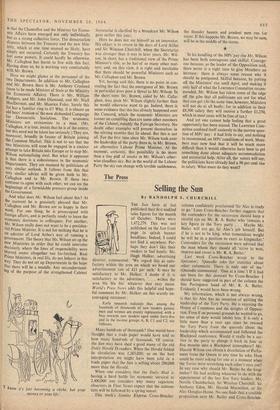The Press
Selling the Sun
By RANDOLPH S. CHURCHILL
satisfactory to the advertisers, . within the area bla bla bla' whatever that may mean. World's Press News adds this helpful and hope- ful comment by Mr. Holker on this scarely en- couraging statement :
Early research indicates that, among the hundreds of thousands of new readers gained, men and women are evenly represented, with a bias towards new readers aged under forty-five and in the income groups A, B, Cl and C2, say Odhams.
Many hundreds of thousands? One would have thought that a trade paper would have told us how many hundreds of thousands. Of course. the Sun may have shed a good many of the old Daily Herald D-readers. When the Herald folded its circulation was 1,265,020; so on the best interpretation we might have been told in a trade paper that the Sun is selling about 200,000 more than the Herald.
When one considers that the Daily Mail is having a hard battle for economic survival at 2,400,000 one considers why many sagacious observers in Fleet Street expect that the autumn tints will be followed by a spring sunset.
This week's Sunday Express Cross-Bencher column confidently proclaimed 'Sir Alec is ready to go.' Later Cross-Bencher further suggests that the contenders for the succession should keep a careful eye on Mr. R. A. Butler who 'remains a key figure in the Tory party . . . Maybe Mr. Butler will not get Sir Alec's job himself. But if he is not to be king, what tremendous weight he will be in a position to exert as kingmaker.' Contenders for the succession were advised that the man whom they should all 'strive to woo, impress and cosset is Mr. R. A. Butler.'
Last week Cross-Bencher wrote to the Spectator: 'Quoodle asks for statistics about other columnists. There is only one of me.' (Quoodle commented : 'One at a time.') If it had not been for this dementi by Cross-Bencher I should have suggested in part of the column the fine Portuguese hand of Mr. R. A. Butler. Evidently I would have been wrong.
My information, which is not always wrong, is that Sir Alec has no intention of quitting the leadership of the Tory Party. He is enjoying the House of Commons and the delights of Opposi- tion. Even if on personal grounds he wanted to go, his sense of duty would inhibit him. It is only a little more than a year ago since he rescued the Tory Party from the quarrels about the leadership which accompanied and followed the Blackpool conference. Would it really be a ser- vice to the party to plunge it back in four or five months into a Blackpool atmosphere? Mr. Harold Wilson can obtain a dissolution of Parlia- ment from the Queen at any time he asks. How could he resist asking for one at a moment when the Tories were scratching each other's eyes out? In any case why should Mr. Butler be the king- maker? He had nothing whatever to do with the appointment of the last five Tory leaders, Mr. Neville Chamberlain, Sir Winston Churchill, Sir Anthony Eden, Mr. Harold Macmillan, or Sir Alec Douglas-Home. No one finds that a credible proposition save Mr. Butler and Cross-Bencher.


































 Previous page
Previous page